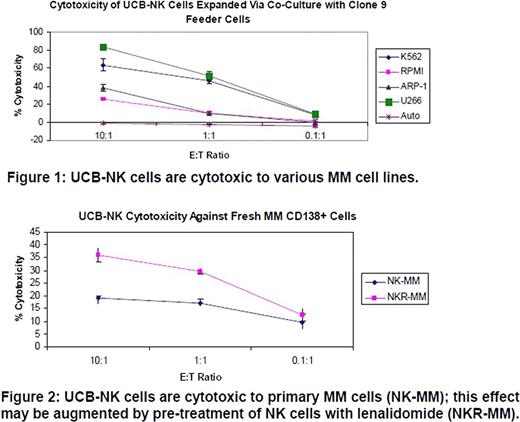Abstract
Abstract 2100
Multiple myeloma (MM) is the second most common hematologic malignancy in adults and, to date, is incurable. Allogeneic natural killer (NK) cells are active in various hematologic malignancies and may have a role against MM. Umbilical cord blood is a potential source for allogeneic NK cells and ex vivo expanded umbilical cord blood-derived NK (UCB-NK) cells demonstrate activity comparable to that of peripheral blood-derived NK cells. Here we demonstrate the anti-myeloma activity of UCB-NK cells expanded to clinical grade by a novel technique using artificial antigen presenting feeder cells (“K562 Clone 9” cells) modified to express IL-21 (“K562-cl9-mIL21”).
Cord blood mononuclear cells (CBMCs) were cultured in 10% human serum albumin media with IL-2 (500 IU/ml) and K562-cl9-mIL21 feeder cells (2:1 feeder: CBMC ratio) for 21 days. Thereafter, cells were subjected to CD3-immunomagnetic depletion. CD3-negative cells were then used as effector cells in functional assays. Flow cytometry was used to confirm NK cell purity (C56+/CD3- cells) and a standard chromium-51 assay was performed to determine NK cell cytotoxicity. Targets included K562 cells, MM cell lines RPMI 8226, ARP-1 and U266, autologous non-neoplastic UCB cells (negative control) and bone marrow-derived CD138+ plasma cells from myeloma patients.
Expansion of CBMCs with K562-cl9-mIL21 yielded a >2000 fold expansion of NK cells, compared with 47 fold expansion of CD56-selected cells cultured with IL-2 alone (p <0.05). After CD3 depletion, UCB-NK cultures were comprised of 92% CD56+/CD3- cells. K562-cl9-mIL21-expanded UCB-NK cells demonstrated cytotoxicity against the classic NK cell target K562 as well as MM cell lines RPMI 8226, ARP-1 and U266 (Fig 1). In addition, these UCB-NK cells were also active against primary, bone marrow-derived CD138+ plasma cells from myeloma patients, an effect which was augmented by pre-incubation of UCB-NK cells with lenalidomide (Figure 2, NK=UCB-NK cells, NKR=UCB-NK cells+lenalidomide).
UCB-NK cells can be expanded ex vivo to clinically relevant doses for allogeneic NK cell therapy via co-culture with K562-cl9-mIL21 feeder cells. Expanded UCB-NK cells are cytotoxic to myeloma cell lines and primary myeloma cells. Further development of UCB-NK cells as an adjunct therapy in stem cell transplantation for myeloma is warranted.
Wang:Celgene: Research Funding; Onyx: Research Funding; Millenium: Research Funding; Novartis: Research Funding.
Author notes
Asterisk with author names denotes non-ASH members.


This feature is available to Subscribers Only
Sign In or Create an Account Close Modal